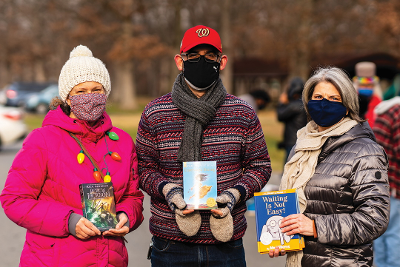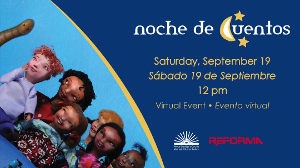Field Notes: Pandemic Diary: Bilingual Virtual Programming
Children’s literature has the unique ability to inspire a lifelong love of reading for children and their families. One of the books that shaped my own understanding of growing up biracial, as a Honduran American, was Arroz con leche: canciones y ritmos populares de América Latina / Rice with Milk: Popular Songs and Rhymes from Latin America by Lulu Delacre.
 Children’s literature has the unique ability to inspire a lifelong love of reading for children and their families. One of the books that shaped my own understanding of growing up biracial, as a Honduran American, was Arroz con leche: canciones y ritmos populares de América Latina / Rice with Milk: Popular Songs and Rhymes from Latin America by Lulu Delacre. This book represented the first time that I saw in print the nursery rhymes and children’s songs my mother sang to me and my brother.
Children’s literature has the unique ability to inspire a lifelong love of reading for children and their families. One of the books that shaped my own understanding of growing up biracial, as a Honduran American, was Arroz con leche: canciones y ritmos populares de América Latina / Rice with Milk: Popular Songs and Rhymes from Latin America by Lulu Delacre. This book represented the first time that I saw in print the nursery rhymes and children’s songs my mother sang to me and my brother.
Now, as a library leader, I challenge all of us to consider how Hispanic culture is represented in our work on a daily basis, and how to ensure that our physical and virtual spaces are actually welcoming to all. At the Prince George’s County Memorial Library System (PGCMLS) in Maryland, where I serve, the demographics are evolving rapidly. Although it is a historically Black community (64%+ according to the U.S. Census), the county’s Hispanic and Latinx population is growing (19%+ as of 2019), creating new opportunities for social service agencies, nonprofits, libraries, and educational institutions to rethink service models. This is a lofty goal, but one that is identifiable and measurable through the encouragement of creativity and recognition of staff expertise at every level.
***
Prior to the COVID-19 pandemic, PGCMLS offered recurring Spanish and bilingual Ready 2 Read storytimes, numerous outreach and cultural programs for Spanish speakers, partnerships with early childhood education organizations (including the Judith P. Hoyer Center Early Learning Hubs), and afterschool literacy and homework support programs such as Leamos @ Your Library and Kids Achieve Club. The library was also in the early stages of enhancing English/Spanish language equity on its website, signage, social media, and communications. These initiatives are foundational for effectively embracing and serving Spanish speakers and holistically incorporating Hispanic culture into a library’s identity.
PGCMLS’s general approach to serving families (Hispanic and non-Hispanic) is to meet the customers where they are, whether in a building or at an outreach event; engage the kids with educational but entertaining programs; and concurrently determine how the library can provide support to adults and seniors. The library’s intercultural services department leads system-wide initiatives such as language conversation clubs. When this is successful, staff members are able to cultivate intergenerational relationships between the families and PGCMLS.
***
During the early months of the pandemic, when PGCMLS buildings were closed, library staff seized the opportunity to radically reinvent programs and outreach efforts in the virtual environment. While most libraries in the National Capital Region were just starting to offer virtual storytimes in English, we quickly moved to begin serving Spanish-speaking families and children through live virtual early literacy programs and new community partnerships. We offered two weekly Spanish read-aloud programs (Biblio-niños) and a weekly bilingual English/Spanish read-aloud, and these programs quickly drew a loyal regular following and one well beyond our service area, with one family tuning in week after week from Chicago, for example.
Come summer, PGCMLS added two new high-profile sports partnerships, with specific elements for engaging Spanish speakers and immersing the community at large in a bilingual culture. The library partnered with Major League Soccer team D.C. United — the first partnership of its kind in MLS history — to provide player storytime programs, workout videos, and activities in English and Spanish. The 2019 World Series champion Washington Nationals joined PGCMLS as the presenting sponsor of Summer @ Your Library, which was offered one-hundred-percent virtual and bilingual in English and Spanish for the first time.

Nicholas A. Brown (center), with Prince George's County Council member Danielle Glaros and PGCMLS CEO Robert Phillips, at the 2020 Greater Riverdale Cares Holiday Distribution.
As the shutdowns progressed, we realized that our e-book and e-audiobook collections (which were the only books accessible between March 16 and July 20, 2020) did not have enough Spanish or bilingual English/Spanish children’s books to keep families engaged. Despite the limited availability of Spanish children’s e-books offered through our vendors, the collections team and Spanish-speaking staff worked to add hundreds of new titles through OverDrive. Paul Moreno, a library staff member who previously worked as a librarian in Colombia, recommended a children’s e-book online resource called Lectorum Digital Library, which offers 600+ Spanish and bilingual children’s e-books written primarily by authors based in Latin America. Because Lectorum’s focus is not U.S. titles that are translated into Spanish (as is so often the case with our traditional e-book collection), their stories reflect the heritage of the local Hispanic community, which includes many Salvadorans, Colombians, Hondurans, Mexicans, and others.
***

Kirsten Grünberg of the Hyattsville Branch Library leads a virtual Spanish/English storytime, part of Family Art Moments with Washington Performing Arts.
During the pandemic, library staff members have led virtual outreach programs for classrooms every week, giving a general introduction to the library and supporting curricula. The virtual Kids Achieve Club provides literacy coaching and homework help from volunteer tutors for primarily English language learners, most of whom are native Spanish speakers. Virtual Hispanic Heritage Month programming included family cooking, crafts, and STEM programs. The library’s arts and culture programming often incorporates children’s features, including performances by Latin GRAMMY winner 123 Andrés, a kids’ art workshop with renowned artist David Amoroso (using the Nearpod platform for interactivity), and Family Art Moments featuring Cantaré with Washington Performing Arts.

PGCMLS in partnership with REFORMA for 2020 Noche de Cuentos program Maya Weaving Alive!
REFORMA partnered with PGCMLS for a special Noche de Cuentos program, Maya Weaving Alive!, which showcased traditional Mayan weaving, stories, and cultural education for children and families, led by presenters Yolanda Alcorta, Julia Sánchez Hernández, and her daughter Victoria Sánchez López. The classic picture book Abuela’s Weave by Omar S. Castañeda was a perfect complement to the presenters’ work, showing the direct connection between the stories we share and the traditions behind them.
In addition to literacy-focused programming, PGCMLS partnered with Prince George’s County Council member Deni Taveras, whose district includes a large portion of the county’s Hispanic population, on the international Welcoming Week initiative in September. This effort celebrates the importance of our immigrant neighbors. Locally, programs were offered for adults and children as part of Hispanic Heritage Month.
***
In just one year of evolution, PGCMLS has dramatically expanded its Spanish and bilingual English/Spanish collection, developed new formats for programs that serve English language learners and English speakers alike, and established a baseline for equity. But our library is still a work in progress. We are continually identifying our community’s needs — both for Spanish speakers and the community at large — and determining what works to sustain engagement, teach cultural competencies, and nurture empathy and understanding.
Everybody in the literary community should feel a responsibility toward the full diversity of Hispanic cultures being represented in programming, curricula, and outreach initiatives year-round. Each individual Latin American country boasts a range of diverse cultures and traditions. Another oft-neglected aspect of Hispanic diversity are the Indigenous languages and heritages in Latin American countries. Improving Spanish language access in our public institutions is a step toward better equity, but what can we do to ensure that speakers of Mam (from Guatemala and Mexico) or Yucatec Maya (from the Yucatán Peninsula) can also feel welcome in our spaces?
Staff expertise and passion, an open leadership structure, and a commitment to engaging Latinx culture in an institution’s strategic plan are all part of the puzzle in bringing one of America’s fastest growing communities to the table of our libraries and literacy initiatives.
From the May/June 2021 special issue of The Horn Book Magazine: The Pura Belpré Award at 25.

RELATED
ALREADY A SUBSCRIBER? LOG IN
We are currently offering this content for free. Sign up now to activate your personal profile, where you can save articles for future viewing.







Add Comment :-
Be the first reader to comment.
Comment Policy:
Comment should not be empty !!!